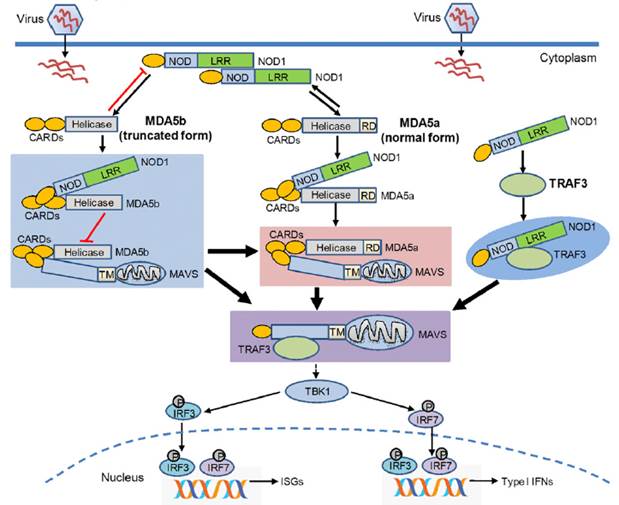Highlights
Researchers Reveal Antiviral Mechanism of Innate Immune Receptor NOD1 in Teleost Fish
Nucleotide binding oligomerization domain containing 1 (NOD1) plays an important role in innate immunity by acting as an intracellular antibacterial pattern-recognition receptor (PRR). Although several studies have indicated that NOD1 also plays a role in sensing viruses, the antiviral mechanisms behind this remain unclear.
A research team led by Prof. CHANG Mingxian from Institute of Hydrobiology (IHB) of Chinese Academy of Sciences revealed the pivotal role of mutual regulation between NOD1 and RLR-mediated antiviral signaling in the innate immune response. The study was published online in The Journal of Immunology.
IHB researchers found that NOD1 deficiency significantly impaired the expression of these genes encoding proinflammatory cytokines and essential antiviral components, which might imply that NOD1-deficient larvae already have an impaired immune system.
Notably, SVCV-infected NOD1-/- zebrafish exhibit reduced survival compared with wildtype counterparts. Mechanistically, NOD1 serves as a receptor for binding spring viremia of carp virus (SVCV) and double strand RNA (dsRNA). NOD1 not only enhances the binding of Melanoma differentiation associated gene 5 (MDA5) splicing isoform MDA5a to dsRNA, but also regulates the formation of MDA5 isoforms-mitochondrial antiviral signaling protein (MAVS) and MAVS-TNF receptor associated factor 3 (TRAF3) complexes.
Interestingly, MDA5 isoforms MDA5a and MDA5b have opposite effects on NOD1 expression. MDA5a can enhance the expression of NOD1, but MDA5b induces NOD1 degradation through the ubiquitin-proteasome pathway. Furthermore, the cumulative effects of NOD1 and the normal form of MDA5 in the formation of the MDA5-MAVS complex and the binding with poly(I:C) are evolutionarily conserved across species. But the short isoform of MDA5 does not seem to exist in mammals, so the NOD1 degradation part of this study is specific to fish.
In conclusion, this study reveals that piscine NOD1 is a positive regulator of MDA5/MAVS normal form-mediated immune signaling, and provides new insights to how NOD1 regulates antiviral immunity.
This work was supported by Strategic Priority Research Program of the Chinese Academy of Sciences Grant, the National Natural Science Foundation of China, and the Science Fund for Creative Research Groups of the Natural Science Foundation of Hubei Province of China.

Proposed model illustrating the intracellular innate immune pathways modulated by NOD1 and MDA5 isoforms (Image by IHB)
Contact:
Prof. CHANG Mingxian
Research Group of Fish Comparative Immunology
Institute of Hydrobiology, Chinese Academy of Sciences
E-mail: mingxianchang@ihb.ac.cn